Early Career Scientist Spotlight
Dr. Jessica Noviello (she/her/hers)
Planetary Geologist
Planetary Systems Laboratory (693)
What motivated you to pursue a career in planetary science?
I came into planetary science from an atypical direction: paleontology. As a kid, I loved dinosaurs. To know that these animals dominated Earth for 160 million years and then rapidly vanished fascinated me. I wanted to know what they looked like, how they lived, what they ate, everything! I even did a paleontology research internship in high school, which is why I know so much about crocodiles. During lunch one day at that internship, I grabbed a book off the shelf of a graduate student about the mass extinction event at the end of the Cretaceous. I sat down and read three chapters that day. It was the first time I read about the Chicxulub impact in such detail, and I was intrigued. I figured: “Dinosaurs are really cool. An asteroid wiped the non-avian ones out. Asteroids must be pretty cool too!” In my undergrad program, I took classes on impact events and planetary geology and geophysics. I was hooked from then on. But I still get to use my paleontology background! How life begins on a planet and how life evolves are questions that the field of exoplanet science are now considering. Being able to think about how life on Earth started, evolved, and ended, sometimes catastrophically, helps me think about what might be happening within the ocean worlds of the Solar System or on distant exoplanets.
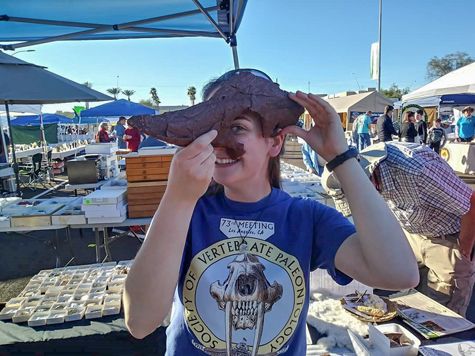
Credit: Jessica Noviello
What does a typical day at work look like for you?
I usually begin with checking my email and Slack workspaces to see if there’s anything urgent I need to address. Then, I’ll check my calendar to see what meetings and deadlines I have and try to plan work periods around those. In smaller blocks of time, I’ll do my science communications work, which includes updating the Nexus for Exoplanet System Science (NExSS) website, posting about exoplanets on the NExSS Twitter account, or writing an article for the next NExSS Newsletter. I do this as the lead of the NExSS Science Communications Working Group (SCWG), a small team that does this work. I may also work on some initiatives I’ve developed, like the Professional Advancement Workshop Series (PAWS). For longer chunks of time, I like to work on my science research. Having those longer periods lets me focus on the work without losing my train of thought. I have a few projects active right now ranging across the Solar System and beyond, so I try to focus on one project a week to make good progress on it before switching to something else. There is certainly no shortage of things to do, but I am not complaining!
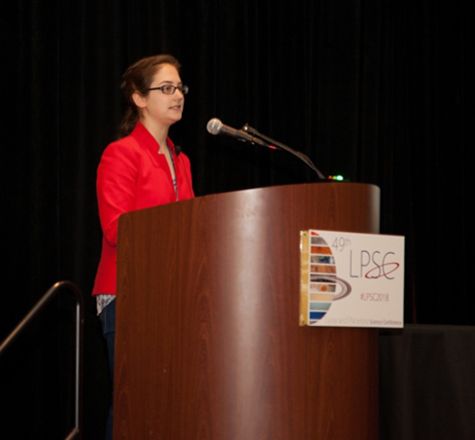
Credit: The Lunar and Planetary Institute
What skills are most useful to you in your work, and where did you develop those skills?
I think the most useful skill I have is time management, but it’s also one that I am constantly working to improve. When I sit down to work, I rank the immediacy of the items on my task list and get those done in order. A rule of thumb I use for planning is however long I expect something to take, I triple that estimated time. It’s not perfect but it helps! When it comes to research, I tend to work slowly to make sure that I understand what I’m doing, why I’m doing it, and how to contextualize it with other work. I am learning to work faster, but I try not to worry too much if things take longer than expected.
Another habit I’ve worked on is taking notes in a journal about the work-related things that I do. If I have an idea for a future project or work on a calculation, I make sure to write it down so when it comes time to discuss it in more detail or write an abstract, I have a record of what my thoughts were.
Finally, I’ve learned to be open about the struggles I have as a professional researcher, which draws a lot on my communications skills. I do so because if I’m honest about my doubts, then others might be encouraged to share as well, or at least recognize that they aren’t alone in feeling a certain way. I learned to do this because I spent time listening to others and reading a lot of books on psychology and emotional intelligence. This makes me great at building connections with others and putting together strong, supportive teams.
Tell us about one project that has been particularly impactful in your field.
The project that I am most proud of so far is the Professional Advancement Workshop Series (PAWS), which is something I started as part of my NASA Postdoctoral Management Program (NPMP) duties. I found myself thinking a lot about what I want to do after my NPMP appointment ends, and wishing I knew more about other paths beyond remaining in academia. I figured if I had those questions, maybe other early career researchers (ECRs) did too. Why not all learn together and help each other? I put together a statement of scope for what ultimately became PAWS and spent weeks revising it with my advisor, Shawn Domagal-Goldman, and Dr. Melissa Kirven-Brooks. In July, PAWS was funded through the NASA Astrobiology Division thanks to Dr. Mary Voytek, which lets me bring in speakers for workshops to teach other ECRs skills that translate to many different career types. It also provides direct access to people who are currently in various careers (NASA management, science policy, industry, etc.), but who all started with academic backgrounds similar to ours. Hearing key information directly from these experts is critical to help ECRs recognize their skill sets and gives them more options in a job search so they can find the best fit for them based on their needs, goals, and skills. The first PAWS event took place in August 2021, so it’s still a new program, but from what I’ve heard so far, this is already helping people figure out their next career steps. I can only hope it grows from here!
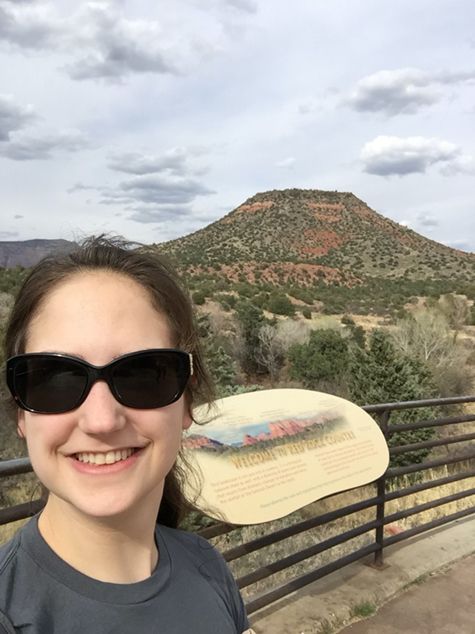
Credit: Jessica Noviello
What science question intrigues you the most?
I think the biggest question that intrigues me is: what are the limits of life? Within that, there are two slightly smaller questions. The first is about the diversity of the ocean worlds in our Solar System and beyond. I am constantly surprised at how many potential ocean worlds there are. For example, Pluto was thought to be a dead dwarf planet, but data from New Horizons presents strong evidence that Pluto has a subsurface ocean right now. That’s mind-blowing to me. With exoplanets, I wonder how many of them are ocean worlds too, and what are the things we should look for to determine that. As a necessary ingredient for life, liquid water is very important for us to find, but I don’t think we appreciate how varied ocean worlds can be, and we need to. The second question is about what it takes to cause a mass extinction on another planet. On Earth, there are 5 major mass extinctions that we know of, and dozens of low-level events. I often wonder, if we assume life existed on an ocean world like Europa or a former one like Mars, what could have happened to wipe that life out by the present? I’d like to apply this question to exoplanets one day.
What are your future research interests and goals?
Honestly, I’d be happy to just finish the projects I’ve already started! Publishing more first-author papers is a goal of mine, and one that the pandemic has slowed. Beyond that, I want to one day go to the successful launch of a mission that I’ve helped to design. I want to teach students, either as a professor or as a research mentor, and support them as they figure out what they want to do, within science or out of it. Eventually, I’d love to figure out how to do planetary analogue work too, since I enjoy field work. Mostly, I want to earn the respect of my peers and be seen as a strong leader in the field, and be part of active, positive change for all.
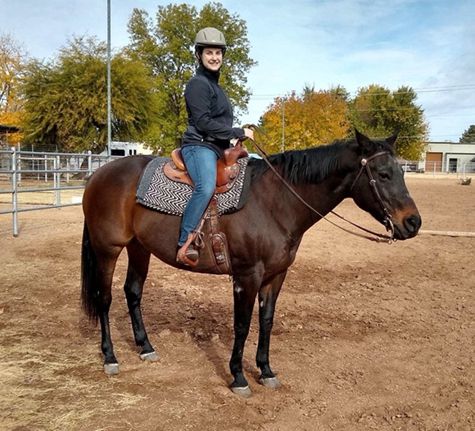
Credit: Jessica Noviello
What do you like to do in your free time?
I took horseback riding lessons when I lived in Arizona for grad school, and those lessons were important for me in managing my mental and physical health successfully. I should get back to doing that because I enjoyed it so much, and I was getting pretty good! I’ve been reading a lot lately because I’m in a book club with friends from grad school, and I’m glad we’ve been able to maintain these friendships despite everything that’s going on. My roommate and I also make time every week to eat tacos and watch a movie together (#TacoTuesday), which helps us both relax. On weekends, there’s a good chance I’m out in a Maryland state park hiking with friends and exploring. And, though it’s harder to do now that I live on the east coast, I still go out on a paleontology dig at least once a year with the Southwest Paleontological Society.
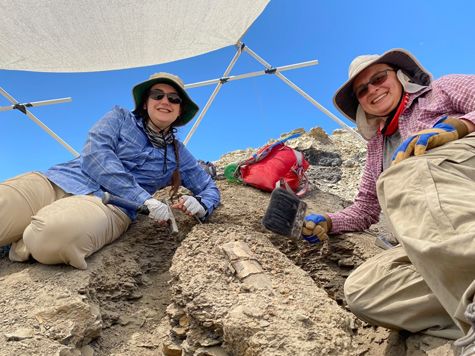
Credit: Jessica Noviello
Biography
Home Town:
Smithtown, NY
Undergraduate Degree:
BS in Physics and BA in Earth and Planetary Sciences, Johns Hopkins University
Post-graduate Degrees:
PhD in Geology (Planetary Sciences concentration), Arizona State University
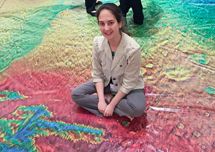
Link to Dr. Noviello's GSFC Bio
